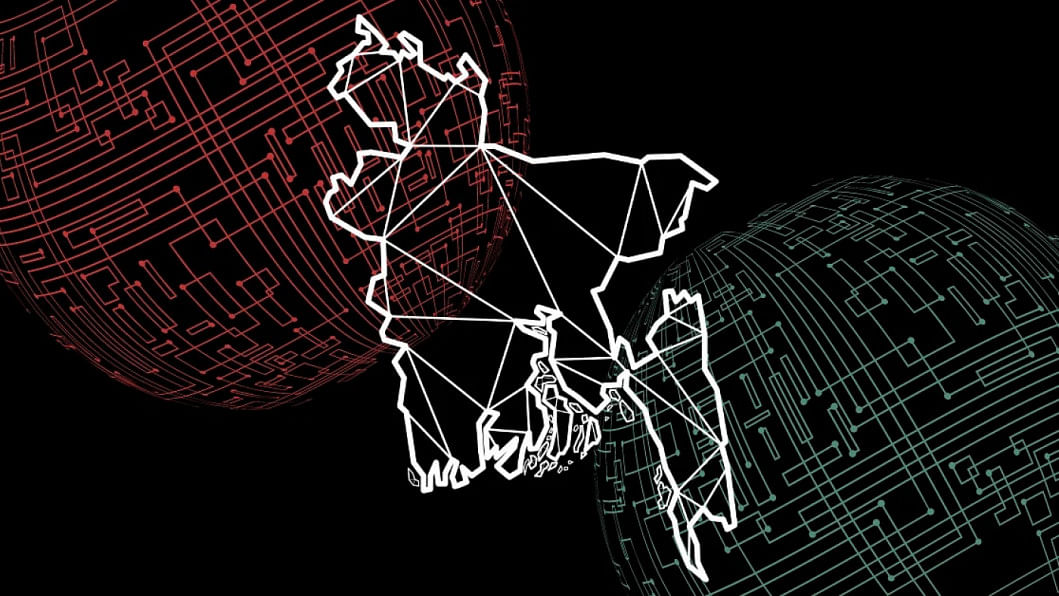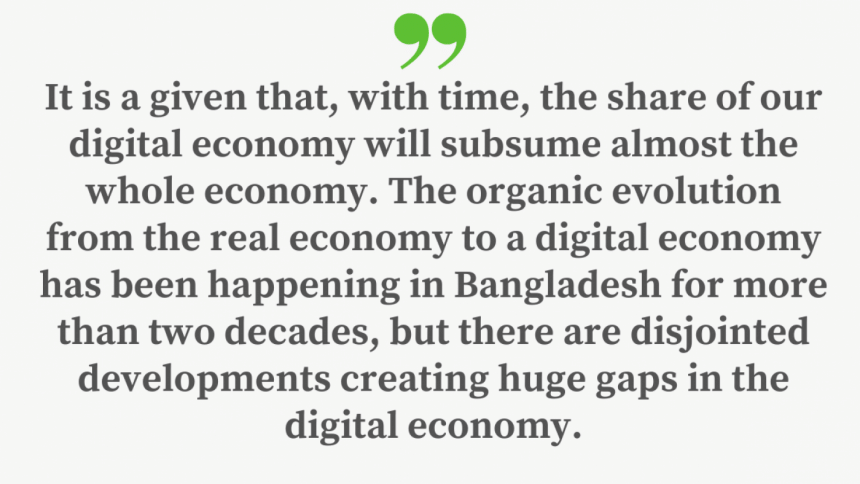The growth and evolution of our digital economy

Over the last three decades, the world has been swept up in digital transformations to the point where point-and-click consummation of everything – from buying groceries and finding romance to settling taxes and working from anywhere – have become the norm. In this digital lifestyle, the demarcation between the physical and the virtual has become fuzzy and transmutable. And this is no longer the private turf of the young generation; today, various facets of this digital lifestyle are openly embraced by an octogenarian video-calling their grandchildren in a far-off land they have never seen, or a semi-literate middle-aged parent in a remote rural area using telemedicine service, or a retired professional using live video streaming to enjoy a game of cricket.
With this new lifestyle comes a new economic paradigm: digital economy. Just as our real identities commingle with our digital avatars, the digital economy also coexists with the real economy. However, its growth and evolution predicate the necessity of formulating new implements fit for the digital era, such as policy on how to tax the digital economic actors, ways and means of regulating electronic payments and digital asset transfers, legal framework for digital privacy, data security and cybercrimes, and many other such issues.
When an e-commerce site within our national borders sells a product, it entails transferring a physical object from a seller to a buyer – no different from buying such a product in a real market or a shop. It is easy to see why such a transaction should automatically come under the purview of a transactional tax such as sales tax or VAT, and all such transactions should accrue towards income tax filing by the seller. But what is not so obvious is how to tax such goods transactions across the borders, or tax digital services such as online advertising or professional services, especially when such services are, again, rendered across the borders.
When an online merchant sells a pair of shoes and ships them from, say, Singapore to Dhaka, how do we ensure that the merchant collects the proper VAT and import duty from the buyer and deposits to Bangladesh's exchequer? Or when some business entity in the country advertises on Facebook or Google, how do we collect the appropriate VAT on such transactions since neither of them have registered subsidiaries in Bangladesh? Or better yet, when a local content provider generates subscription and advertising revenue off of YouTube, how do we bring such income under the income tax regime?
Such questions have been faced not only by the tax administration in Bangladesh, but all over the world. The expansion of tax net to the digital economy is imperative if we want to ensure a level playing field for both the real and digital economies. Then again, in the real economy, there are tiny players – small street-corner tea stalls or shoe-shine stands – that justifiably should not be chased by tax collectors. Similarly, in the digital economy, there are tiny merchants selling a few artefacts on Facebook or online stores who should not be taxed, while the medium-to-big online merchants, whether local or international, must pay their fair share of taxes.

However, taxing the digital economic actors entails new approaches that the tax administration must learn how to incorporate into their modus operandi. This should take into account similar measures taken by other countries. For example, the Organisation for Economic Co-operation and Development (OECD) has chalked up elaborate regulatory measures to collect and apportion taxes on cross-border e-commerce transactions. India has even introduced an equalisation levy on multinational e-commerce enterprises.
However, all such taxation measures are inexorably tied to cultural adoption of electronic payments and the tax administration automatically getting its due share in a routine fashion. Here we see a tremendous gap between the rapidly rising volume of transactions in our digital economy and the share of such transactions that are settled electronically.
A recent IFC study on electronic payments has found that since 2010, there has been a fivefold increase in online payments, but the bulk of that is due to the electronic settlement of public service salaries and pensions in Bangladesh. It is very strange to note that the private sector and the general public are lagging behind the government in terms of their overall share of electronic payments. For lack of a better analysis, we can generally attribute this anomaly to cultural disinclination towards and lack of trust in electronic payment methods; Bangladesh has the lowest penetration in the region for non-cash instruments of payments, such as credit/debit cards and digital wallets.
The monstrous growth in mobile financial transactions over the last 15 years is still dominated by point-to-point (through agents) and person-to-person (P2P) transactions. On the other hand, the vast majority of e-commerce order fulfilment is still done via cash on delivery (COD). This has to change in order to take the shackles off our digital economy.
For the vast majority of the people, the electronic payment purveyors must come up with systems that are easy to use as well as inexpensive in terms of transaction costs. And only then it may bring on the cultural change and mainstream adoption of electronic payment methods that we have shied away from, despite huge growth in digital financial transactions in the last 10 years.
It is a given that, with time, the share of our digital economy will subsume almost the whole economy. The organic evolution from the real economy to a digital economy has been happening in Bangladesh for more than two decades, but there are disjointed developments creating huge gaps in the digital economy, especially in terms of digital payments and getting a fair share of taxes from the digital economy. It is high time the government and the private sector developed a trusted partnership to embark on an exhilarating journey towards our destined digital economy in an accelerated manner.
Habibullah N Karim is a digital entrepreneurship promoter, investor, and writer.

 For all latest news, follow The Daily Star's Google News channel.
For all latest news, follow The Daily Star's Google News channel. 










Comments